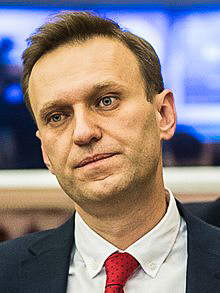
Wikimedia Commons
Just days after Russian politician and anti-corruption activist Alexey Navalny fell ill from suspected poisoning, more than 100 University affiliates signed a statement in late August urging the Russian government to fully investigate the assault against a former Yale World Fellow.
Though he has spent most of his life in Russia, Navalny spent time at Yale as a 2010 World Fellow. On August 20, Navalny fell ill on a flight to Moscow from a suspected poisoning, according to the BBC. Rumors swirled that the Russian government was involved in the incident, prompting international backlash and calls to action from Navalny’s former Yale colleagues.
“We are shocked, saddened and angered at the apparent attack on Alexey Navalny, a 2010 Yale World Fellow,” the statement reads. “We admire Alexey for his courage to speak out against corruption; his persistent campaign for human rights; and his belief in the future of Russia.”
A Kremlin spokesman stated to reporters that the allegations regarding Russia’s involvement in the poisoning were “just speculation.” According to Navalny’s page on the Global Affairs website, he founded the Anti-Corruption Foundation and gained notoriety for his investigations into Russian officials and state corporations. As of Sept. 1, Navalny is undergoing treatment at a hospital in Germany, where he was transported on Aug. 22.
Many World Fellows who worked with Navalny signed off on a letter condemning the incident. 2010 World Fellow and Member of the European Parliament Sergey Lagodinsky stated that the poisoning was a tragedy and added that the “reputational capital” of Yale’s Fellows could make a powerful statement to the Russian government. Lagodinsky told the News that he knew Navalny personally, and though they disagreed on some issues, the “human tragedy” supersedes political differences.
World Fellows Program Director Emma Sky wrote in an email to the News that the response from the World Fellows network has been “amazing,” with over 160 fellows from 80 countries signing onto the letter. Sky also stated that the World Fellows form tight bonds that last even after they leave Yale.
“Many World Fellows have a sense that democracy is on the retreat and that authoritarianism is rising,” Sky wrote. “They feel the space for dissent is shrinking. They feel vulnerable. So they stand by each other and show support. Every World Fellow knows that if they are ever arrested, threatened or attacked, they are part of a community that will stand in solidarity with them. Once a World Fellow, always a World Fellow — World Fellows for life.”
Marvin Rees — the current mayor of Bristol in the United Kingdom — said that Navalny was his neighbor when they were both 2010 World Fellows. He added that they would go apple picking nearby and helped one another adjust to New Haven.
According to Rees, he signed the letter supporting Navalny because he knows him personally, and admires him as a staunch critic of corruption. He added that some of their cohort warned Navalny against going back to Russia following the end of the fellowship — but he returned anyway.
“It’s not just about Alexey, it’s about the world,” Rees said. “The most prominent countries in the world … they contribute to a global standard. Their liability, any weakness that’s found, their inability to deal with criticism, sets an example to the rest of the world, sets a bar. And if they set the bar low, the world hits a low bar. And that’s a real problem.”
Current global affairs professor and 2010 World Fellow Ted Wittenstein ’04 LAW ’12 wrote in an email to the News that he was “devastated” at the poisoning of Navalny.
Wittenstein added that he is hoping Navalny will recover soon.
“Alexey has dedicated his life to holding the Russian leadership accountable and demanding a far more inclusive, fair, and responsible government — with unfathomable courage and at great personal risk,” Wittenstein wrote. “All of us are hoping for his strong recovery, as the Russian people and the world need Alexey now more than ever.”
Launched in 2002, the World Fellows Program now boasts a network of over 300 fellows hailing from over 90 countries.
Valerie Pavilonis | valerie.pavilonis@yale.edu







